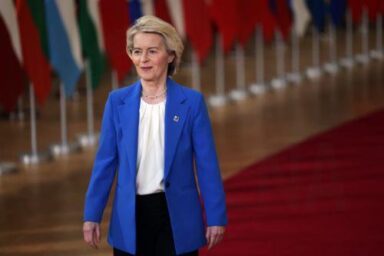As Brussels tightens its regulatory screws on disinformation and platform dominance, people are making ever more money through social media. They do so in all sorts of unsavoury ways — and with terrible consequences.
“Unregulated social media monetisation is at the heart of our information integrity crisis,” Sarah Murphy Madia, policy leader at What to Fix told members of the European Democracy Shield parliamentary committee. What to Fix is a tech policy and accountability non-profit working to bolster the integrity of the internet.
At issue is the fast-expanding world of platform-led monetisation programs. Under these, social media platforms directly pay creators for content performance. While framed as empowerment for digital creators, Madia argued that these systems “are being rolled out on unfair terms and extremely recklessly”.
In fact, these schemes are bringing great profit to the industry. “Meta earned $160bn last year in advertising revenue. They redistributed $2bn of those dollars to creators and publishers, that’s barely 1.3%,” she noted. “Snapchat, in contrast, redistributed 13 per cent. So we know it can be more.”
You might be interested
Sanctioned accounts are still monetised
Ms Murphy Madia called for EU-level regulation of platform monetisation services. They fall through the cracks of existing frameworks like the Digital Services Act (DSA), Digital Markets Act (DMA), and European Media Freedom Act (EMFA), she argued.
Her remarks follow evidence that EU-sanctioned individuals remain enrolled in Meta’s monetisation programs, despite restrictions on FIMI (foreign information manipulation and interference). To this day, Ms Murphy Madia said, “There are individuals sanctioned by the EU for FIMI activities that they have carried out on social media who are somehow being vetted by and in theory receiving money from social platforms right here in Europe.”
There are individuals sanctioned by the EU for FIMI activities that they have carried out on social media — Sarah Murphy Madia, policy leader at What to Fix
That revelation included real examples. Nathalie Yamb, a Swiss-Cameroonian activist, was sanctioned by the EU for pro-Russian activities. However, according to Madia, “To this day, she continues to be listed by Facebook as monetised through their revenue redistribution program.”
Oversight vs freedom
MEPs were divided on how far the EU should go. Some warned of overreach. Beata Szydło (ECR/POL) cautioned that regulation “must not result in restrictions on freedom of speech”. She argued that “member states should have a leading role” in managing the online advertising and information markets.
This is one of the causes why traditional media that adheres to journalistic standards is increasingly defunded — MEP Alexandra Geese (Greens-EFA/DEU)
Others, such as MEP Alexandra Geese (Greens-EFA/DEU), framed the issue as a structural threat to democratic discourse. “Monetisation creates a disinformation industry,” Ms Geese said. “It rewards those content creators that focus on disinformation, on propaganda, outrage, anger, hate, and violence. The actual underlying root is the way that content is ranked. And that is engagement-based ranking”, pointing to its impact in the news industry. “This is one of the causes why traditional media that adhere to journalistic standards are increasingly defunded. Because in that kind of ranking, there is no way they can compete.”
In that context, the MEP raised the prospect of classifying engagement-based ranking as a “systemic risk”. This could apply under Article 34 of the DSA.
Use the DIgital Fairness Act
Ms Murphy Madia’s intervention pushed the debate into the transparency of monetised content. Her organisation proposes mandatory on-platform monetisation disclosures to inform users when content is being financially rewarded. As well as public registers identifying who profits and how much. “Just as users deserve to know when they are being targeted by advertising”, she said, “users also deserve to know when the actors and content they interact with on social media are being rewarded financially.”
She further proposed linking these aspects to the forthcoming DFA (Digital Fairness Act). Under the new legislation, it could be possible to codify compensation rights for publishers and creators unfairly demonetised. “If they are erroneously demonetised, the platform ought to owe them compensation for the time in which they were not making money,” she said.
This debate comes just as Meta and Google have stopped carrying political, electoral, and social issue advertising in the EU. This change took place as the European Union Transparency and Targeting of Political Advertising Regulation took effect on 10 October. Both companies said the new rules are too complex and legally uncertain to follow.
The monestisation sovereignty
The committee on EUDS also raised concerns about European dependence on US platforms to regulate monetisation terms. “We have American platforms that decide themselves who is who is paid and how much,” noted Ms Murphy Madia, pointing to the EU’s existing regulatory ecosystem as a potential lever.
“The European Union has the strongest, most coherent set of digital legislation anywhere,” she said. “The DSA, DMA, EMFA, and the upcoming Digital Fairness Act all offer opportunities to hold platforms to account in ways that nowhere else can.”
The exchange underscored the need for EUDS work to expand beyond traditional disinformation to the economic incentives that sustain it. For policymakers, the focus should be wider than the content shared online, but on who profits from it and under what terms.











